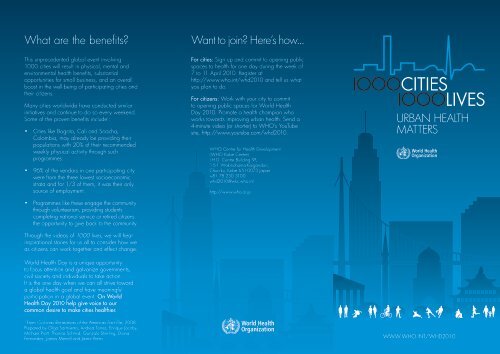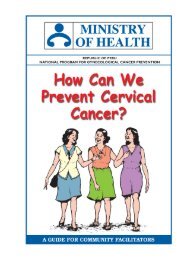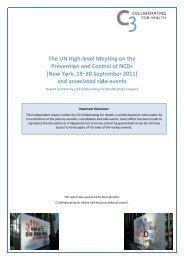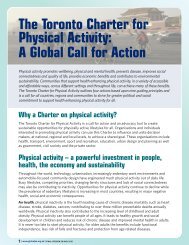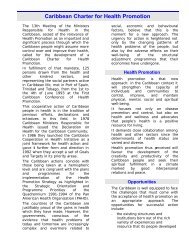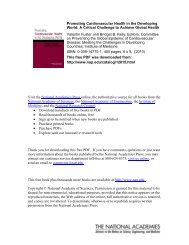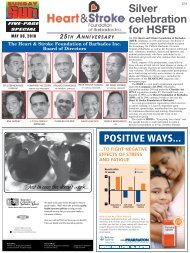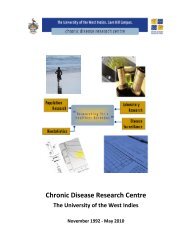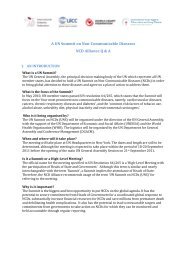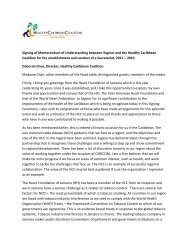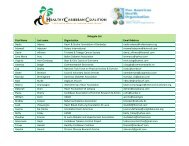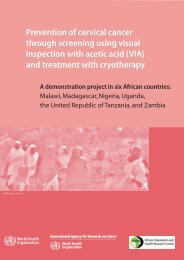1000 Cities 1000 Lives - World Health Organization
1000 Cities 1000 Lives - World Health Organization
1000 Cities 1000 Lives - World Health Organization
Create successful ePaper yourself
Turn your PDF publications into a flip-book with our unique Google optimized e-Paper software.
What are the benefits?<br />
This unprecedented global event involving<br />
<strong>1000</strong> cities will result in physical, mental and<br />
environmental health benefits, substantial<br />
opportunities for small business, and an overall<br />
boost in the well-being of participating cities and<br />
their citizens.<br />
Many cities worldwide have conducted similar<br />
initiatives and continue to do so every weekend.<br />
Some of the proven benefits include 1 :<br />
• <strong>Cities</strong> like Bogota, Cali and Soacha,<br />
Colombia, may already be providing their<br />
populations with 20% of their recommended<br />
weekly physical activity through such<br />
programmes.<br />
• 96% of the vendors in one participating city<br />
were from the three lowest socioeconomic<br />
strata and for 1/3 of them, it was their only<br />
source of employment.<br />
• Programmes like these engage the community<br />
through volunteerism, providing students<br />
completing national service or retired citizens<br />
the opportunity to give back to the community.<br />
Through the videos of <strong>1000</strong> lives, we will hear<br />
inspirational stories for us all to consider how we<br />
as citizens can work together and effect change.<br />
<strong>World</strong> <strong>Health</strong> Day is a unique opportunity<br />
to focus attention and galvanize governments,<br />
civil society and individuals to take action.<br />
It is the one day when we can all strive toward<br />
a global health goal and have meaningful<br />
participation in a global event. On <strong>World</strong><br />
<strong>Health</strong> Day 2010 help give voice to our<br />
common desire to make cities healthier.<br />
1<br />
From Ciclovias Recreativas of the Americas Fact File, 2008.<br />
Prepared by Olga Sarmiento, Andrea Torres, Enrique Jacoby,<br />
Michael Pratt, Thomas Schmid, Gonzalo Stierling, Diana<br />
Fernandez, James Merrell and Jaime Parra.<br />
Want to join? Here’s how...<br />
For cities: Sign up and commit to opening public<br />
spaces to health for one day during the week of<br />
7 to 11 April 2010. Register at<br />
http://www.who.int/whd2010 and tell us what<br />
you plan to do.<br />
For citizens: Work with your city to commit<br />
to opening public spaces for <strong>World</strong> <strong>Health</strong><br />
Day 2010. Promote a health champion who<br />
works towards improving urban health. Send a<br />
4-minute video (or shorter) to WHO’s YouTube<br />
site, http://www.youtube.com/whd2010.<br />
WHO Centre for <strong>Health</strong> Development<br />
(WHO Kobe Centre)<br />
I.H.D. Centre Building 9F,<br />
1-5-1 Wakinohama-Kaigandori,<br />
Chuo-ku, Kobe 651-0073 Japan<br />
+81 78 230 3100<br />
whd2010@wkc.who.int<br />
http://www.who.or.jp<br />
URBAN HEALTH<br />
MATTERS<br />
WWW.WHO.INT/WHD2010
The 2010 global goal<br />
<strong>1000</strong> cities <strong>1000</strong> lives<br />
Be part of a global<br />
movement to make cities<br />
healthier<br />
<strong>World</strong> <strong>Health</strong> Day 2010 will focus on<br />
urbanization and health. With the campaign<br />
<strong>1000</strong> cities, <strong>1000</strong> lives, events will be<br />
organized worldwide:<br />
• <strong>1000</strong> cities: <strong>Cities</strong> around the world are<br />
called on to open up public spaces to health<br />
for one day during the week of 7 to 11 April<br />
2010 – whether it be activities in parks,<br />
town hall meetings, clean-up campaigns, or<br />
closing off portions of streets to motorized<br />
vehicles.<br />
• <strong>1000</strong> lives: Citizens are asked to provide<br />
stories of urban health champions who have<br />
taken action and had a significant impact on<br />
health in their cities.<br />
Urbanization is one<br />
of the greatest health<br />
challenges in the 21 st<br />
century<br />
Urbanization is a trend that is here to stay. In<br />
2007, for the first time in history, over half the<br />
world’s population was living in cities. By 2030,<br />
6 out of every 10 people will be living in urban<br />
areas.<br />
Take action now to ensure health today<br />
and for our future generations.<br />
Urbanization is associated with many health<br />
challenges related to water, environment,<br />
violence and injury, noncommunicable diseases<br />
(cardiovascular diseases, cancers, diabetes and<br />
chronic respiratory diseases), unhealthy diets and<br />
physical inactivity, harmful use of alcohol as well<br />
as the risks associated with disease outbreaks.<br />
Although the threats to urban health are great,<br />
the overall picture is far from bleak. Embracing<br />
the positive side of urban health goes beyond<br />
the roles and responsibilities of government<br />
to include the contributions that civil society,<br />
community groups, architects, engineers, and<br />
responsible businesses can make.<br />
What can we do about it?<br />
The <strong>1000</strong> cities, <strong>1000</strong> lives campaign provides<br />
a platform to bring communities together towards<br />
a common goal united around health – municipal<br />
authorities, civic groups, and individuals. It is also an<br />
opportunity for people to enjoy exercise, music and<br />
being outdoors with friends and neighbours. Local<br />
businesses can enjoy increased sales, and all can enjoy<br />
the sense of community the day will bring.<br />
Open public spaces to health.<br />
What is done on <strong>World</strong> <strong>Health</strong> Day is up to the<br />
creativity, desires, and priorities of each city. Using the<br />
streets for free, safe cycling may be fun, but perhaps tai<br />
chi, classical or traditional music concerts, or enjoying a<br />
5 or 10-km walk with your mayor, sports stars or other<br />
celebrities is more applicable to the context of your city.<br />
Nominate a health champion you know.<br />
Individuals are a powerful force within urban settings,<br />
making changes that have enormous health benefits for<br />
us all. Do you know someone like this?<br />
• Ohishi is a Japanese boy with asthma who lobbied<br />
for two years to reduce exposure to secondhand<br />
smoke in his city of Shizuoka.<br />
• Citizens from an informal settlement in India<br />
proposed to pick up trash in its alleys, and only<br />
needed the municipality to provide a truck.<br />
Through the videos of <strong>1000</strong> lives, we see what can and<br />
is being done.<br />
For more information on the types of activities your city can sponsor,<br />
see the web site http://www.who.int/whd2010. The <strong>1000</strong> lives<br />
stories are available on YouTube at<br />
http://www.youtube.com/whd2010.


